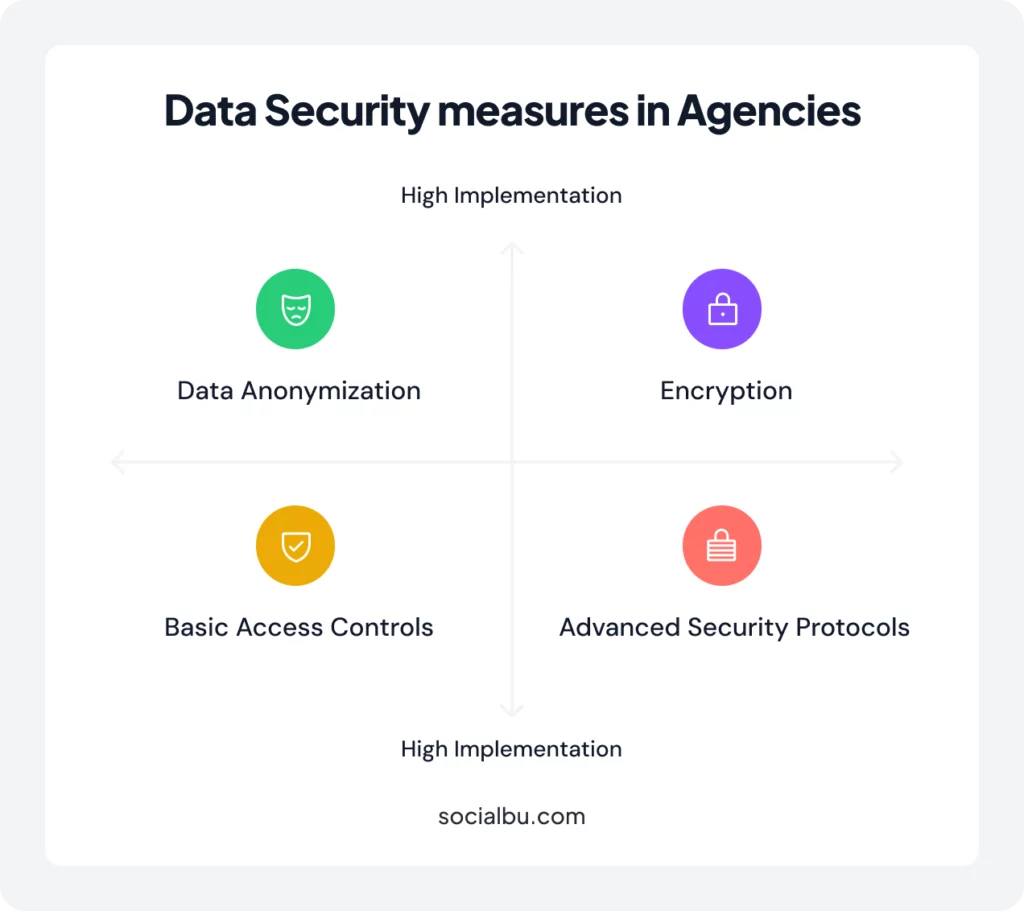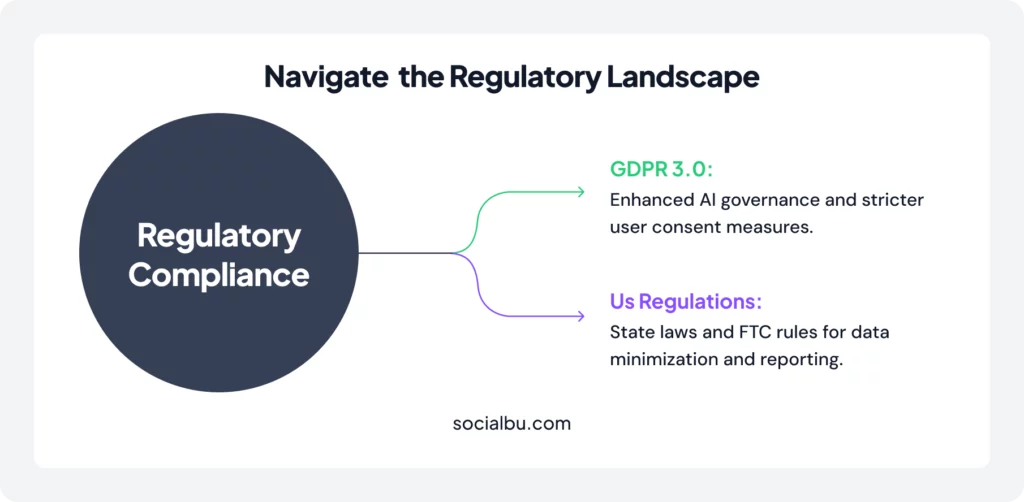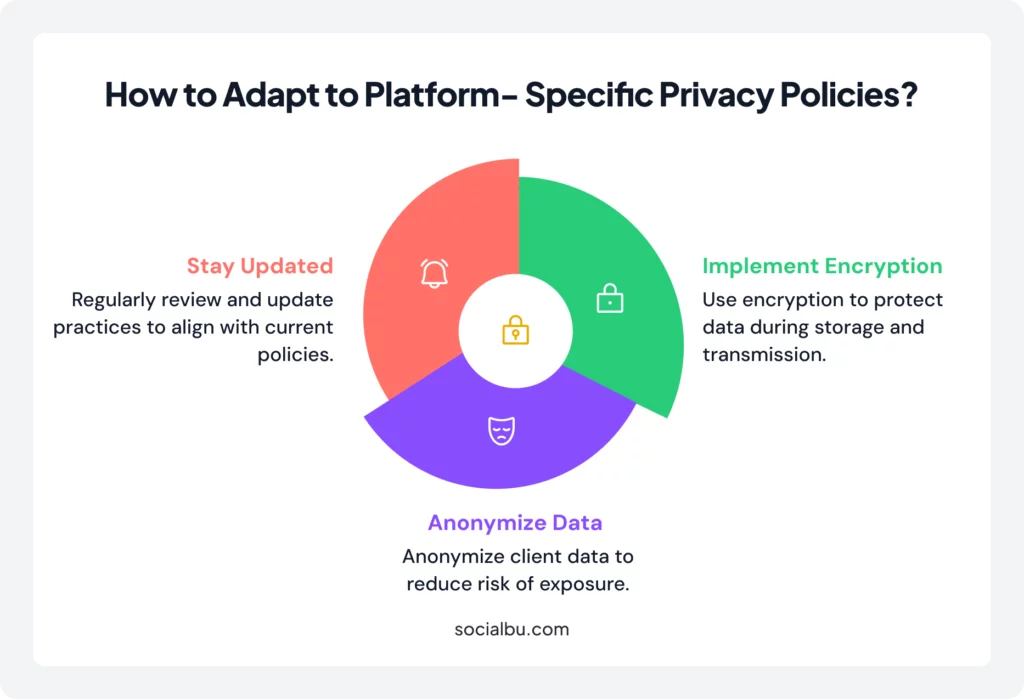As social media platforms grow more complex, agency owners face rising challenges in protecting client data across multiple channels like Instagram, Facebook, and LinkedIn. With users increasingly wary of data misuse by advertisers, agencies must prioritize client data protection on social media platforms.
Not to mention, the increase in data usage in the AI space has led to data privacy concerns being neglected by corporations.
This blog explores the current state of social media data privacy, key challenges, and how agencies can overcome these to stay compliant.
What Is the Current State of Social Media Data Privacy?
Social media is facing numerous privacy concerns, with users now calling for revised privacy regulations and laws that protect their private data, such as live locations and email addresses.
Moreover, protecting social media data has become increasingly difficult, especially in the AI era, where corporations view data as a goldmine for training their AI models.
With that being said, new regulations are continuously being released alongside updates to existing ones, such as the GDPR. As users become more aware of their digital footprints and increasingly demand greater control over their information, they are pressuring companies to implement data sharing policies for agencies.
Key Data Sharing Policies for Agencies Trends Include:
- User Distrust: 38% of users have reduced their social media use due to privacy concerns, with many believing that platforms collect data without their knowledge.
- Regulatory Shifts: Laws like GDPR 3.0 impose stricter rules on user consent, data anonymization, and third-party access.
- Platform Practices: Platforms like Instagram and Facebook have been criticized for their problematic data retention practices.
What Are the Key Privacy Challenges Agencies Face in 2025?
If you run a social media agency, the most critical challenge is safely handling your clients’ data. For instance, if your client owns an e-commerce store, priority might be gatekeeping their product-hunting strategies.
Let’s break down some of the most prevalent challenges for client data protection on social platforms.
Handling Sensitive Client Data
Agencies manage a large amount of sensitive client data, including demographic information, engagement patterns, and personal details. To ensure that the data is handled securely, it must be stored, processed, and accessed only by authorized personnel.
This is crucial for preventing breaches and maintaining client trust.
To address data safety, agencies are utilizing techniques such as Data anonymization and encryption, which are increasingly essential for protecting sensitive information.
Balancing Personalization With Privacy in Social Media Campaigns
Another major challenge that agencies face is finding the best balance between personalizing user content and maintaining data privacy.
As personalized ads rely heavily on user data, data agencies must ensure they do not violate privacy settings or consent rules.
That said, agencies should now prioritize innovative ways to deliver social media campaigns that promote zero compromise on stealing user data.
All this involves a shift towards first-party and zero-party data strategies, where user consent is explicitly obtained for targeted advertising.
Challenges with Third-party Data Sharing
One of the primary reasons for client data leaks is that social media data privacy agencies share their data with third-party partners. The reliance on third-party access for analytics, advertising, and other tools poses serious privacy risks.
To tackle this, social media agencies should either handle all client work in-house or work diligently with a third-party agency to safeguard against any data breaches.
Adapting to Platform-Specific Privacy Policies
When managing your clients’ social media accounts, it is essential to be aware of the platform-specific policies, as each platform has its own set of privacy settings and data handling policies.
Agencies should stay updated on the frequently changing rules to ensure that their data practices are current and remain valid across all social media platforms.
How Do Social Media Data Privacy Laws Affect Compliance in 2025?
Social data privacy laws and compliance are undergoing significant changes as the tech world transitions into the AI era.
In 2025, regulatory compliance is non-negotiable for agencies. Key laws include:
GDPR 3.0:
- AI Governance: Algorithm Impact Assessments for automated systems and bans on high-risk AI profiling.
- Stricter Consent: Bans “dark patterns” and requires equal-visibility opt-out options for user consent.
- Extended Liability: Cloud providers and parent companies are liable for breaches.
US Regulations: State laws, such as California’s CPRA, are in effect, alongside FTC rules that require annual data minimization audits and 48-hour breach reporting for sensitive data.
What Are the Best Practices for Agencies Using SocialBu?
SocialBu is a top-tier social media management tool that handles all your social media needs, from scheduling and automating content to analyzing it.
Most importantly, social media tools are your most valuable assets for 2025 privacy compliance. Agencies leveraging SocialBu should implement the following best practices:
3>Ensuring Client Data Privacy
SocialBu, along with its rich scheduling features, ensures data privacy, including data encryption (TLS 1.2 for data in transit and at rest) and secure data storage in access-controlled facilities.
This adds a strong client data protection social platform.
Staying Updated with SocialBu’s Privacy Policy and Updates
Agencies must regularly review and understand SocialBu’s Privacy Policy and security updates. This ensures alignment with SocialBu’s commitment to protecting user data and adapting to evolving privacy regulations.
SocialBu explicitly states that user data is “Not being sold to third parties, outside of the approved use cases,” which is a crucial aspect of ethical data handling.
Leveraging SocialBu’s Features for Privacy Compliance
SocialBu’s features are designed with data measures and regulations in mind. Its privacy policy details data handling, aiding agencies in meeting the requirements of GDPR 3.0.
Features such as scheduling and analytics ensure real-time Data Subject Access Request (DSAR) compliance.
How Agencies Can Ensure Compliance When Using SocialBu
Now that you know how SocialBu protects social media data privacy, let’s look at how agencies can leverage SocialBu for compliance.
SocialBu Privacy Features Overview
SocialBu offers features to support 2025 privacy compliance:
| Challenge | Solution | SocialBu Feature |
|---|---|---|
| Handling Sensitive Client Data | Secure storage, deletion requests | Data deletion via email or account settings |
| Personalization vs. Privacy | Clear consent, anonymization | Analytics with GDPR-compliant data handling |
| Platform-Specific Policies | Understand platform rules | Supports multiple platforms with secure data use |
| Third-Party Data Sharing | Strict vendor oversight | Limited third-party access, PCI-DSS compliance |
Conclusion
Ensuring social media data privacy is becoming complex as social media platforms push for AI-enabled features, requiring users to sacrifice their data.
However, with regulations like GDPR 3.0, addressing privacy challenges, and by using SocialBu, agencies can ensure client data protection on social platforms while maintaining trust.
SocialBu’s features, such as secure data handling and compliance support, make it a valuable ally for 2025 privacy compliance. The social media management features, such as data handling and compliance support, make it a valuable ally for 2025 privacy compliance.
Start by exploring SocialBu’s free plan at socialbu.com to streamline your social media campaigns without compromising data privacy.
FAQs
What data privacy rules should agencies follow in 2025?
Agencies must comply with the GDPR, India’s DPDPA, and US state laws, such as the CPRA and CDPA. They should also adhere to platform-specific data sharing policies for agencies, ensuring user consent and data anonymization to maintain transparency and accountability.
How does GDPR impact social media management?
GDPR social media agency compliance requires strict user consent processes, real-time DSAR fulfillment, and secure data handling to avoid fines up to €20 million or 4% of global revenue.
Can agencies store client social data securely?
Yes, by utilizing client data protection, social platforms like SocialBu employ secure data storage and deletion practices. Agencies should implement data anonymization and limit third-party access to comply with regulatory requirements.
What measures protect user privacy?
Measures include obtaining explicit user consent, utilizing privacy settings effectively, implementing data anonymization, and limiting third-party access. Agencies should also stay informed about platform privacy policies.
What measures protect user privacy?
Key measures to protect user privacy include obtaining explicit user consent for data collection and processing, implementing data anonymization techniques where possible, and providing clear and easily
accessible privacy settings.








